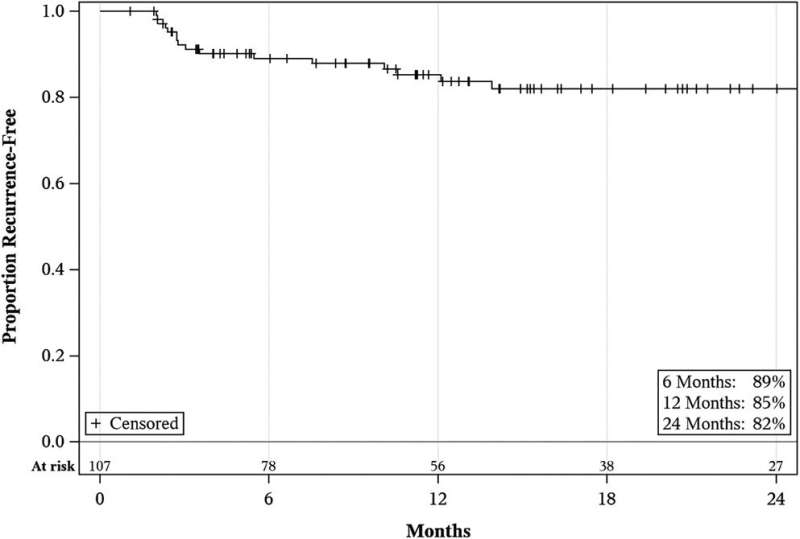Intravesical chemotherapy combination provides effective treatment alternative for non-muscle invasive bladder cancer

A combination of two intravesical chemotherapy drugs—gemcitabine and docetaxel—yields high response rates with good tolerability in patients with high-risk non-muscle-invasive bladder cancer (NMIBC), reports a study in The Journal of Urology.
The "Gem/Doce" combination provides a safe and effective alternative for treatment of high-risk NMIBC, according to recently published research by Vignesh Packiam, MD, and colleagues of University of Iowa Hospitals and Clinics, Iowa City. Having an effective alternative option is especially important during the ongoing shortage of bacillus Calmette-Guérin (BCG)—the standard therapy for patients with this common bladder cancer diagnosis.
Largest study to date of Gem/Doce combination for high-risk NMIBC
About 70% of newly diagnosed bladder cancers are non-muscle invasive, meaning that they have not grown into the deeper layers of the bladder wall. While most of these cancers can be managed with endoscopic and less invasive treatments, some characteristics of NMIBC place patients at increased risk of experiencing cancer progression over time.
For these patients with high-risk NMIBC, the ideal management is bladder-preserving tumor resection followed by intravesical (inside the bladder) administration of BCG: an immune therapy (non-chemotherapy) treatment that activates the immune system to attack cancer cells and prevent recurrence. In recent years, manufacturing problems have led to continuing shortages of BCG. That has prompted many hospitals to use Gem/Doce as an alternative therapy.
However, "robust data supporting this practice is lacking thus far," Dr. Packiam and colleagues write. At their hospital, Gem/Doce has become used almost exclusively for initial treatment of high-risk NMIBC. The researchers analyzed their experience with Gem/Doce in 107 patients treated between 2013 and 2021. None of the patients had previously received BCG or other treatments for bladder cancer.
Improved outcomes for patients
Follow-up data showed "excellent" outcomes after Gem/Doce treatment. After 2 years, 82% of patients were alive and free of recurrent bladder cancer. Although the study did not include a BCG-treated comparison group, the recurrence-free survival rate was comparable to previous studies of BCG treatment.
None of the patients had cancer progression or died of bladder cancer. Side effects were generally mild to moderate; 96% of patients were able to complete their planned treatment.
The study provides new information on the use of Gem/Doce as an alternative to BCG for initial treatment in the large group of patients with high-risk NMIBC. As with BCG, the results support the generally good outcomes of bladder-sparing treatment for these early-stage bladder cancers.
"Gem/Doce is an effective and well-tolerated therapy for BCG-naive NMIBC," Dr. Packiam and co-authors conclude. "In the context of ongoing BCG shortage, our results highlight an effective and readily available alternative treatment in this patient population. " The researchers believe their findings will provide a useful benchmark for future trials to confirm the effectiveness of Gem/Doce as first-line treatment for high-risk NMIBC.
More information: Ian M. McElree et al, Sequential Intravesical Gemcitabine and Docetaxel for bacillus Calmette-Guérin–Naïve High-Risk Nonmuscle-Invasive Bladder Cancer, Journal of Urology (2022). DOI: 10.1097/JU.0000000000002740




















